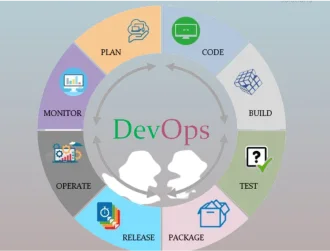Rapid technological development has changed how CIOs plan strategies, allowing them to achieve different goals. Operational excellence, backed by a strong DevOps adoption in projects, can drive the speed of innovation, improve reliability and quality, enhance productivity, and accelerate time-to-market.
A survey revealed that 68% of CIOs agree that the task of revenue generation has become a fundamental component of their responsibilities. The challenge for the CIOs is implementing their traditional duties without increasing the budget. This is where DevOps can help.
What is DevOps?
DevOps is a combination of words software development (dev) and operations (ops). An organization’s software development (Dev) and IT operations (Ops) teams can achieve business goals faster through DevOps principles, cultural philosophies, and practices.
Software developers, operations engineers, quality assurance experts, and other stakeholders are likelier to work together through the DevOps lifecycle. It breaks down standard barriers and pushes cross-functional teams to work together throughout the software development process. Thus helping promote a sense of ownership and duty among team members.
Automation, not human work, is at the heart of DevOps. Automation is one of the most important aspects of the DevOps method. But what is the primary goal of DevOps?
The primary goal of DevOps is to simplify routine tasks like building, testing, and releasing applications, reduce errors, improve output, and provide software faster. DevOps allows teams to focus on innovation, quality, and offering value to end users.
DevOps is all about continuous delivery and not putting out new versions daily. Continuous delivery encourages teams to embrace the DevOps way of thinking. It means regularly releasing small pieces of new software, bug fixes, and other changes.
Instead of waiting for big updates, DevOps teams release small changes often. This helps gather feedback faster, deliver goods to markets quicker, and adapt to changing customer needs on short notice.
What are the key principles of DevOps?
DevOps is more than just the tools and platforms used. DevOps principles are a cultural trend that calls for togetherness, openness, and a shared belief that things should always be getting better for everyone in the company.
There are several key components of DevOps. All these components speed the development process, improve team collaboration, encourage configuration as code, and enhance software quality.
DevOps tools and technologies are based on the following DevOps principles :
- Collaboration
- Data-Based Decision Making
- Customer-Centric Decision Making
- Continuous Improvement & Continuous Delivery (CI/CD)
- Automation
- Infrastructure as Code (IaC)
- Monitoring and Feedback
Which is not a key component of DevOps?
One key component not included in DevOps’s basic principles is “Security.” But, security is an essential part of DevOps and is termed “DevSecOps.
Quantifying DevOps outcomes
In today’s cutthroat business world, the ability to shift gears and adjust quickly is vital. DevOps is a versatile approach that combines programming and server administration.
It affects not just the development and distribution of software but also the way businesses communicate with their most valuable resources—their employees and clients.
Let’s take a closer look at DevOps’ economic and financial advantages.
- Setting new standards for customer support
One obvious advantage of implementing DevOps is an enhanced customer experience. According to CA Technologies’ global survey, 74% of software and IT companies that implemented DevOps reported improved customer satisfaction.
This expansion is not coincidental; instead, it is due to the increased efficiency with which a high-quality product can be made following DevOps principles. This results in an excellent DevOps services company that leaves consumers wanting more and increases company credibility.
- Boosting effective workflow
Workers using DevOps technologies and work cycles are 43% more productive, faster, and more reliable than conventional infrastructures. New software development projects have strict deadlines.
Common results of conventional work practices include delays, inefficiency, and excessive overtime. It is a game-changer since it streamlines the software development and deployment processes via automation and CI/CD technologies.
Because of this, engineers may be able to reclaim time that was previously spent on mundane tasks. As evidence of its efficacy, It allows deployments to occur 200 times more often than traditional methods. As a result of less time spent on mundane chores, productivity increases by 43% as employees can focus on more strategic initiatives.
- Fostering loyalty in the workforce
Successful companies invariably have dedicated employees. Dedicated workers improve client satisfaction and increase the likelihood that they will stay with the firm. DevOps boosts employee engagement by reducing inefficiencies and removing barriers.
Since it is now simpler for groups to determine whether or not their ideas will succeed, employees have greater control over their work. It is widely known that highly engaged employees are more likely to stay with their current company and work together effectively in high-performing DevOps companies.
Financial Outcomes
Although customers and workers are essential to every successful business, money keeps the wheels turning. Your goods and your staff will benefit from the addition of monetary worth.
It motivates you to manage the company and the resources to acquire cutting-edge equipment and top talent. The money and time you save by using DevOps will blow your mind.
Let’s look at some of the results that make things click.
- Monetary savings
The impact of DevOps on revenue has been amazing. DevOps’s ability to cut down on wasted time and effort is a significant factor in its low cost. Technology teams that excel at their jobs spend far less time on frivolous activities than their counterparts who struggle.
At a sizeable technological company, even the highest-performing teams squander $693 million annually on unplanned tasks and redos, while the low performers waste a whopping $1.071 billion. Using automation and ingenious approaches, It drastically cuts these costs by 40%, yielding significant financial benefits.
DevOps is a boon for large and medium-sized software companies, which may lose up to $1 billion an hour due to downtime costs and about $1 million due to product failure. Evidence piles up that adopting a DevOps approach raises productivity, cuts costs year after year, and frees up funds for other purposes.
- Work hour savings
It not only boosts workday output but also lowers expenses. If companies can reduce engineering time by 10% annually, they will have a competitive advantage over traditional IT companies and be able to raise production by 110%.
Although this percentage may not seem like much, the freed time can be diverted to other, more significant projects. ROI rises due to more productive product releases, happier customers, and more total output because of this efficiency improvement.
- New business growth
Adopting DevOps principles leads to a snowball effect of enhanced business growth. Revenue gains and improved client satisfaction might pave the way to expansion. When businesses see a rise in income, they have the resources to invest in making their infrastructure better and more robust.
Due to enhanced efficiency and production, groups now have more time to devote to revenue-generating activities. CA Technologies research establishes the potential of DevOps, indicating that implementing DevOps tools and technologies can increase revenue-based performance by 40%.
It is more than a methodology; it’s a driving force behind transformational shifts in company practice. By placing a premium on both people and cash, DevOps aids businesses in adjusting to and thriving in a dynamic marketplace. Investing in DevOps is not a choice but a must-do to succeed in the modern digital environment.
Final words
DevOps offers groundbreaking outcomes for businesses, finances, and employees. The result shows how much you have achieved, not just what. It demonstrates how an organization can improve its finances and business outcomes.








